Over the course of World War I, 3,059 McGill men enlisted in the active forces. Of those, 363 lost their lives and 791 decorations were awarded, including two Victoria Crosses. Women, not eligible for the active forces, also contributed in important ways. Many were ambulance drivers who worked close to the various fronts (including France, Belgium and Serbia), nurses and volunteers – particularly in service to the Red Cross. McGill also contributed research into areas such as armoured vehicles, acoustics, anti-submarine technology, explosives and medical research and practice.
The McGill Library and Archives house many important documents and items related to World War I. Below are the top 10 items from our archives and rare and special collections.
10. The McGill Daily, War Contingent Supplement, March 1915: This particular edition of the McGill Daily publication provides a fascinating snapshot of McGill life and opinion during the First World War. The Archives hold several editions, including one hardbound copy. The volume contains numerous essays, articles, photo prints and even adverts dating from the wartime era.
9. Sir William Osler’s day book: In this excerpt from his journal dated August 31, 1917, Osler writes about the death of his son during the war: “I was sitting in my library reading recent asthma articles for the new citation of my textbook when a telegram was brought in from Harvey Cushing at no 41 Casualty Clearing Station stating, ‘Revere dangerously wounded comfortable, and conscious, condition not hopeless.’ I knew this was the end. We had expected it. The Fates do not allow the good fortune that has followed me to go with me to the grave – call no man happy till he dies. The W.O. [War Office] telephoned in the evening that he was dead…A sweeter laddie never lived, with a gentle loving nature. He had developed a rare taste in literature and was devoted to all my old friends in spirit – Plutarch, Montaigne, Browne, Fuller, and above all Izaak Walton, whose Compleat Angler he knew by heart and whose ‘Lives’ he loved. We are heart broken, but thankful to have the precious memory of his loving life.”
8. Women’s War Register Holdings: These holdings highlight an often overlooked part of early war history: the contributions of women to the war effort and to ensuring the continued stability of the local workforce. These records help tell the story of Women’s War Registry Committee Chairwoman Ethel Hurlbatt and other McGill-affiliated women who performed various support activities for the troops.
7. World War I Pamphlet Collection: The World War I Pamphlet Collection, housed in Rare Books and Special Collections, has 1,796 items covering all aspects of the war and its aftermath. Among the subjects covered are: propaganda, recruiting, alleged atrocities, submarine warfare, rehabilitation and post-war re-integration, and the Paris Peace Conference. The material is primarily in English and much of it is anti-German. Most pamphlets were collected by Montrealers during the war and reflect their experience of it. The bulk of the collection was donated to the Library in the 1930s and 1940s.
6. The Canadian Officers’ Training Corps, McGill Contingent: This archival collection contains many original photographs, printed materials, news clippings and original documents that tell the story of McGill military training from 1912 onward and the connection to the 148th McGill Battalion of the Canadian Expeditionary Force.
5. The Diary of Clare Gass: This personal journal recounts the experiences of Clare Gass, a nurse with the Canadian Army Medical Corps of the #3 Canadian General Hospital in France and England from March 4, 1915 to December 31, 1916. It contains an early appearance of the poem “In Flanders Fields”. A hand-written copy of the poem can be found in her diary entry for October 30, nearly six weeks before its December 1915 publication in the magazine Punch. Accompanying the text are various items that were originally placed within the pages of the diary, including newspaper clippings, manuscript notes and letters, a photograph, pencil drawings, and 10 dried plant specimens.
4. The Canadian General Hospital, No.3 (McGill): These archival holdings contain numerous original photographs related to the McGill No.3 Hospital, the first hospital unit created by a University during World War I. The hospital, headed up by Dr. Herbert Stanley Birkett, McGill’s Dean of Medicine (1914-1921), provided medical and surgical care to military personnel stationed at Dannes-Camiers and Boulogne, France.
3. Canadian War Posters Collection: Among the holdings of the Print Collection in the Rare Books and Special Collections Division are some 250 Canadian posters from the two World Wars. Canadian war posters were produced for a specific audience and for specific purposes. While they were not meant to be archival or historical documents, their time and place specificity have made them an important resource for today’s researchers and members of the public who are interested in wartime life. In 2005, the Library digitized its collection of war posters.
2. The McGill Honour Roll 1914-1918: This commemorative volume lists the names of those who served and those who gave their lives in World War I. Also included is a written dedication, an introductory essay on McGill’s involvement in the war, a list of other individuals who served, and a statistical summary. A digitized version of the Honour Roll is available for all to view on the McGill Remembers site.
1. Hand-written poem of McCrae’s In Flanders Fields: A hand-written version of John McRae’s famous poem is found in the Osler Library of the History of Medicine. In a hand-written letter to his friend, Carlton Noyes, dated 31 May 1916, McCrae, a Canadian physician and onetime pathology lecturer at McGill, included his poem and modestly stated that it had become quite popular. Noyes kept the letter and, upon his death, it was passed on to his wife, May Noyes (née Metcalfe), who was a McGill nursing graduate. When she died in 1940, the letter was sent to McGill and deposited in the Osler Library of the History of Medicine.




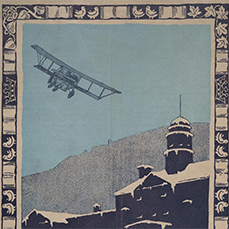
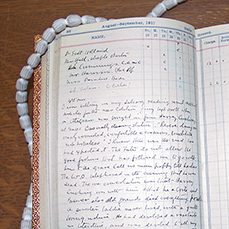
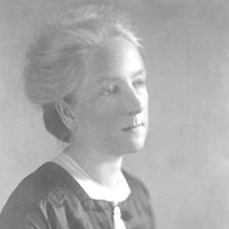
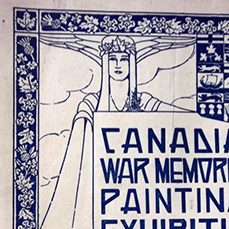
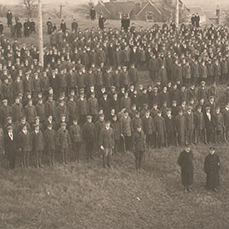
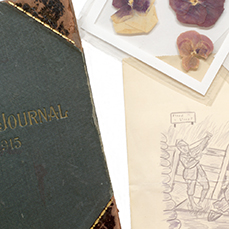
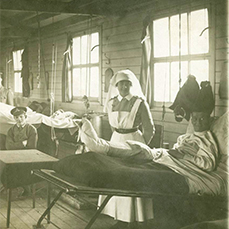
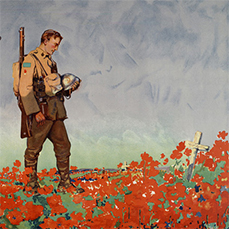
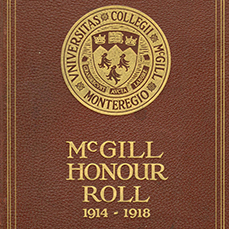
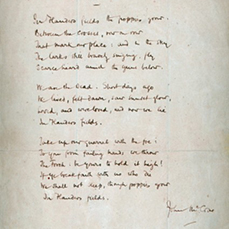










Fascinating collection from WWI — thank you for posting these treasures. Amazing that the library houses original writings by John McCrae and by Sir William Osler, and even more amazing that we can look at them from afar. One question: why has a single line been deleted from the text of Osler’s moving daybook entry in which he wrote of his son’s death in the war? It’s an important comment that any medical historian would be interested in, and a curious omission from your version: Right after the sentence “The W.O. telephoned in the evening that he was dead” Osler writes: “The one consolation was that Harvey Cushing was with him….” How interesting that Cushing should be the surgeon at the bedside of Osler’s dying son!
Thanks for clarifying!
N Barker
Hello!
We included this excerpt because it focused on the loss of Revere. You do raise a valid point about Dr. Cushing. Here is the entry in its entirety:
You mention being happy to access this information from afar. Please know that you are welcome to see all items featured in this article in person. All materials in the Library system including rare items from the Osler Library of the History of Medicine, Rare Books and Special Collections and McGill University Archives are accessible and open for view by the general public. All you need do is call the specific branch to request to see a particular item. Please consult our main website http://www.mcgill.ca/library to find out more.
Many thanks!
Merika
Communications Officer, McGill Library